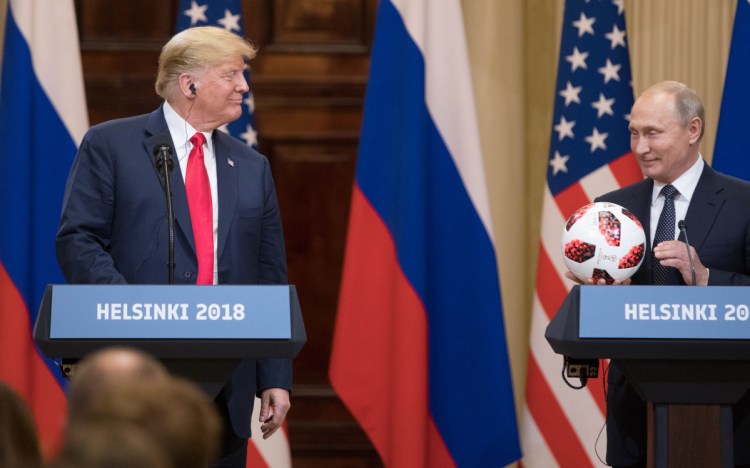WASHINGTON — Robert Mueller has for the first time publicly connected Donald Trump’s presidential campaign and business to the Russian government, adding a significant new chapter to the special counsel’s ongoing investigation into Russian efforts to interfere in the 2016 elections.
In a guilty plea Thursday, Trump’s former lawyer and fixer Michael Cohen admitted that he spoke with Trump and Russian officials as late as June 2016 – a month before Trump officially accepted the Republican presidential nomination – about a potential business deal in Moscow that Cohen told Congress had ended months earlier.
Here are some of the key takeaways from Cohen’s plea for lying to Congress:
n It ties Trump to Russia during the campaign.
Mueller’s “criminal information” filing lays out multiple exchanges between Cohen, real estate developer Felix Sater and Russian government officials about a proposed Trump tower development in Moscow.
While the deal never went through, conversations about it between Cohen, Trump, his family and at least one campaign official came as Russia was in the midst of a sophisticated plan to meddle in the U.S. election that American intelligence agencies found was intended to hurt Democrat Hillary Clinton and ultimately to help Trump win.
“This is enormous,” said Mimi Rocah, a former federal prosecutor. “We’re seeing financial motives and financial entanglements with a foreign power who interfered in our elections.”
Cohen discussed the Moscow tower project with Trump at least four times, including the possibility that the presidential candidate would travel to Russia, according to the filing. Cohen also briefed Trump family members about it and discussed the possible travel with a senior campaign official.
On May 5, days after Trump had won the heavily contested Indiana primary and appeared all but certain to clinch the nomination, Cohen was invited by a Russian official to a conference in St. Petersburg with the offer of a possible meeting between Cohen and Russian President Vladimir Putin or Prime Minister Dmitry Medvedev.
Cohen was actively planning for the trip, including filling out relevant forms, until it was called off in mid-June for a reason the statement doesn’t specify. On June 14, 2016, the Washington Post reported that Russian government hackers had penetrated the network of the Democratic National Committee and gained access to the party’s opposition research file on Trump.
Cohen had told the House and Senate intelligence panels in a two-page statement in August 2017 that all talk of the Moscow project ended in January 2016, emphasizing that was before any of the presidential caucuses or primaries. He said he made the false statement, which is a crime, to help Trump and limit the ongoing Russia probes.
n It doesn’t prove collusion or conspiracy by itself.
It’s not illegal for a presidential candidate to simultaneously explore possible business deals overseas, as Trump emphasized to reporters on Thursday. But the ongoing contacts raise continuing questions about Trump’s attitude and motivations toward Russia.
As a candidate and as president, Trump has continued to say he wanted to get along with Putin, at times saying he believed the Russian leader’s assurances that his country didn’t meddle in the election despite the finding by U.S. intelligence agencies that it did.
n It adds to a list of Russian contacts with Trump associates.
Right about the time Cohen was in contact with Russian officials and discussing a possible Russia trip for Trump, campaign foreign policy adviser George Papadopoulos was doing the same.
The day before Cohen was invited to the St. Petersburg conference, possibly to meet Putin, a Russian contact emailed Papadopoulos saying his country was “open for cooperation” and offering to arrange a meeting with him in Moscow. Several weeks later, Papadopoulos emailed a senior campaign staffer trying to set up a Trump trip to Moscow, writing “Russia has been eager to meet Mr. Trump for quite sometime.”
On June 9, while Cohen was preparing paperwork for his trip to Moscow, a Russian lawyer visited Trump Tower in New York for a now infamous meeting with Trump’s son Donald Trump Jr, son-in-law Jared Kushner, and campaign chairman Paul Manafort. Cohen called off his trip to Moscow days later.
In early July, another Trump campaign adviser, Carter Page, traveled to Moscow where he gave a commencement speech and says he briefly interacted with Deputy Prime Minister Arkady Dvorkovich and had a meeting with Andrey Baranov, head of investor relations for oil giant Rosneft and an aide to Rosneft Chief Executive Officer Igor Sechin.
Send questions/comments to the editors.



Success. Please wait for the page to reload. If the page does not reload within 5 seconds, please refresh the page.
Enter your email and password to access comments.
Hi, to comment on stories you must . This profile is in addition to your subscription and website login.
Already have a commenting profile? .
Invalid username/password.
Please check your email to confirm and complete your registration.
Only subscribers are eligible to post comments. Please subscribe or login first for digital access. Here’s why.
Use the form below to reset your password. When you've submitted your account email, we will send an email with a reset code.